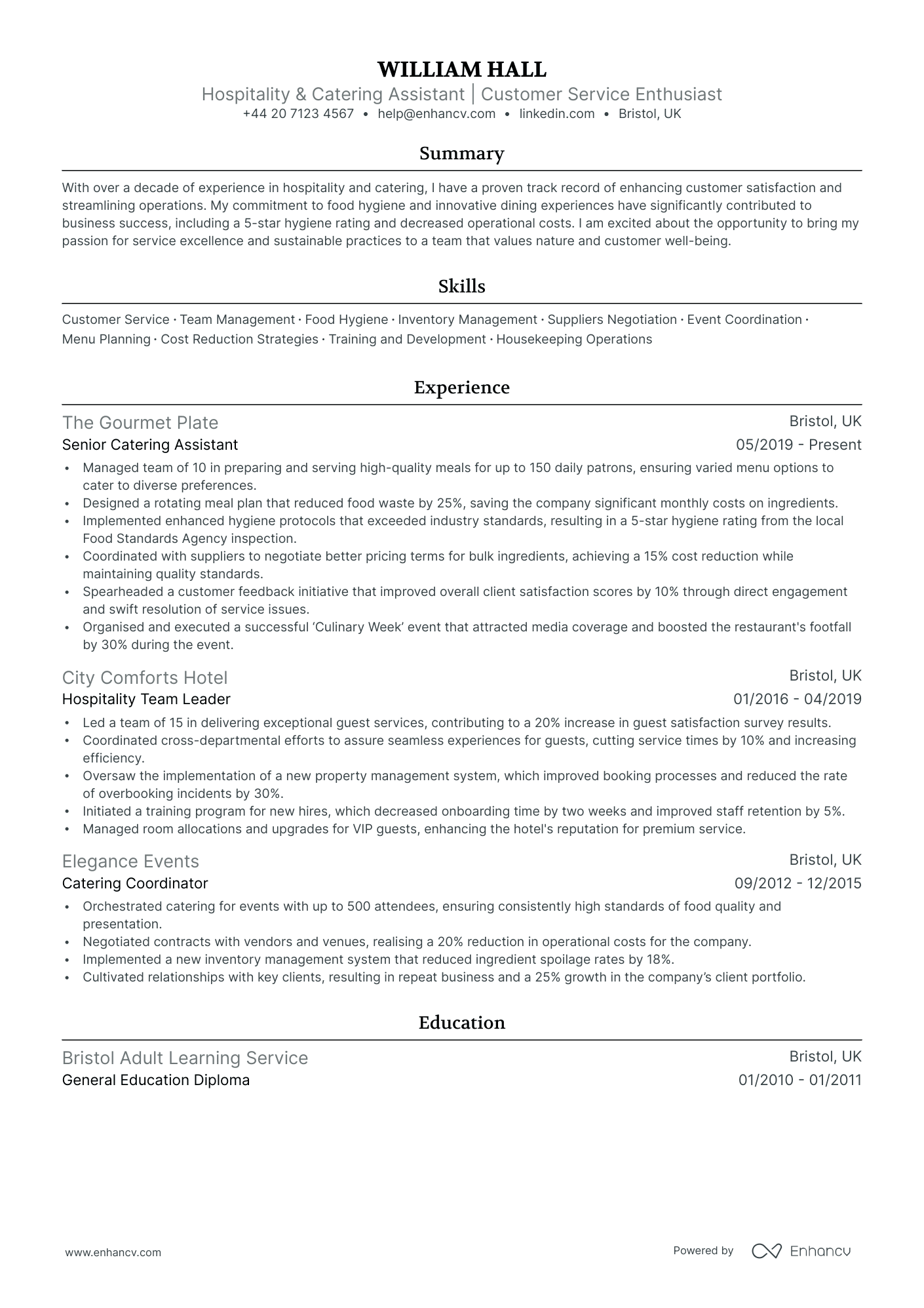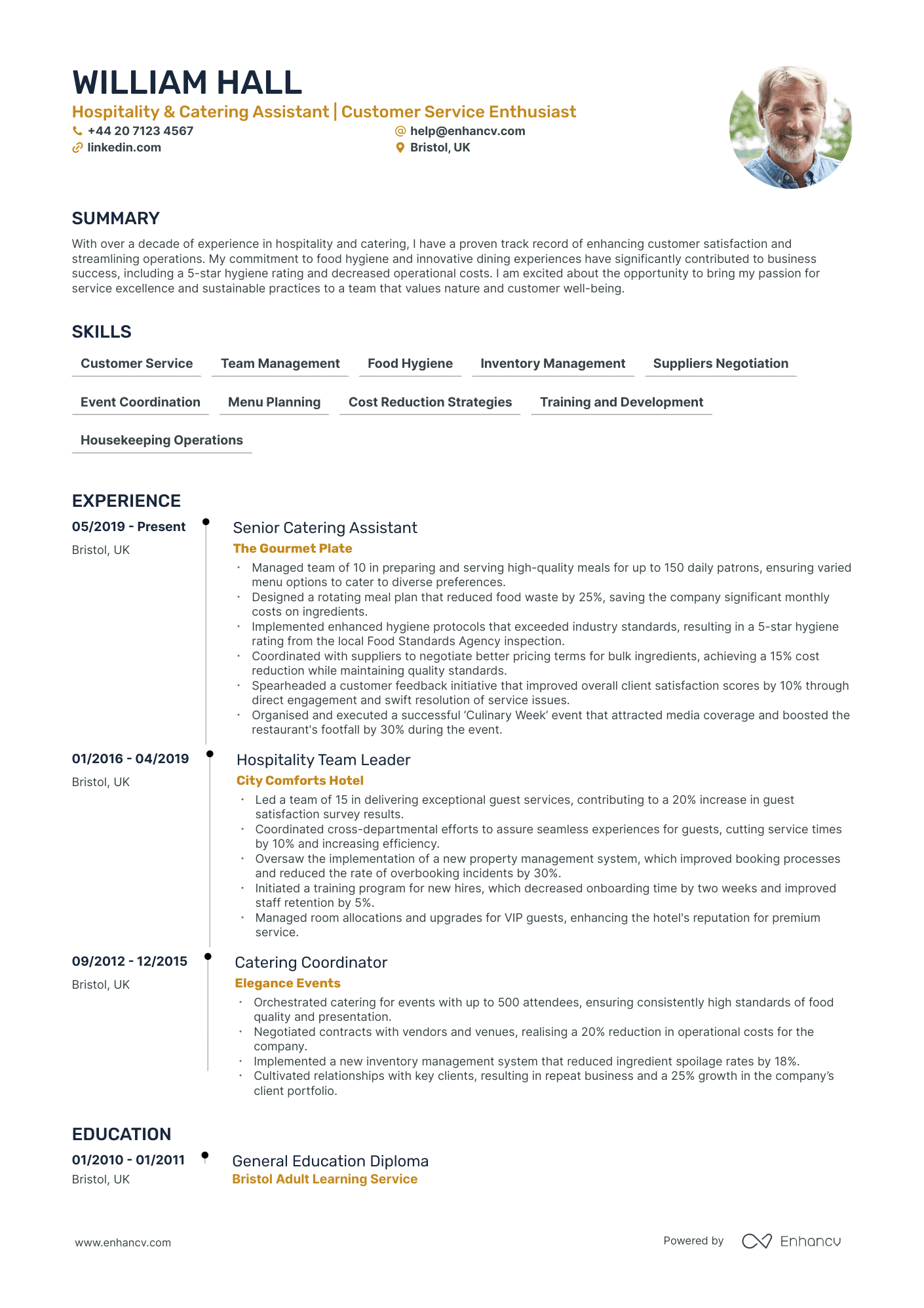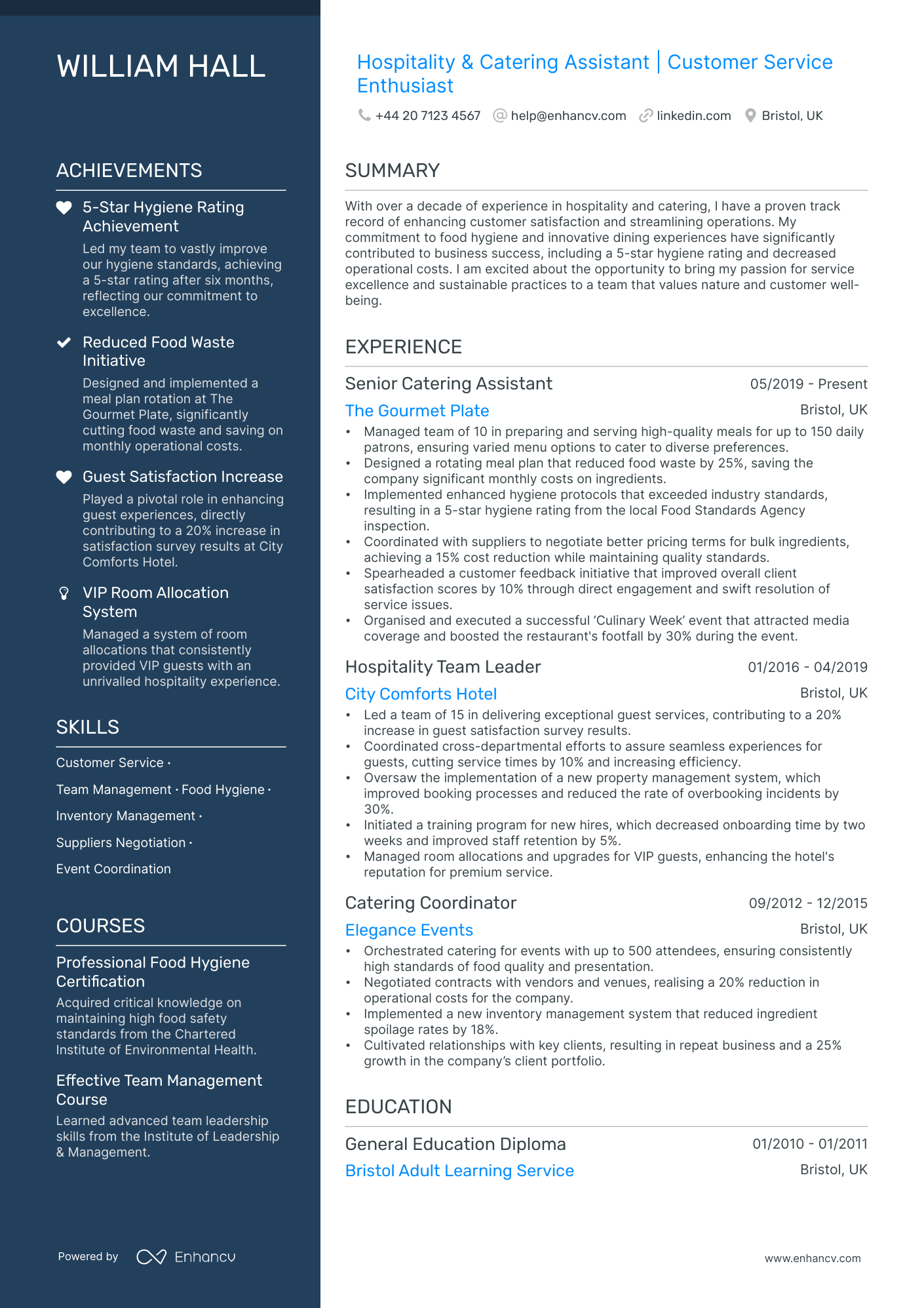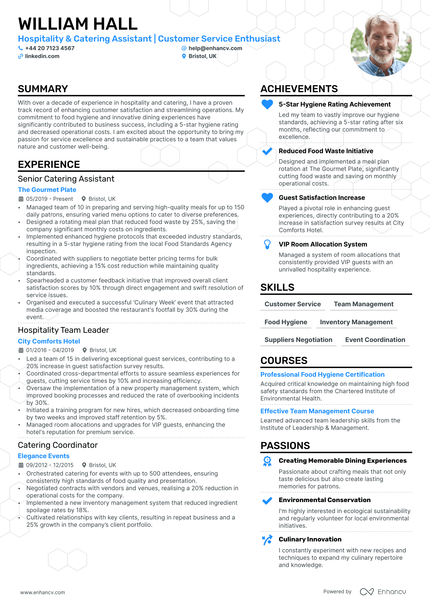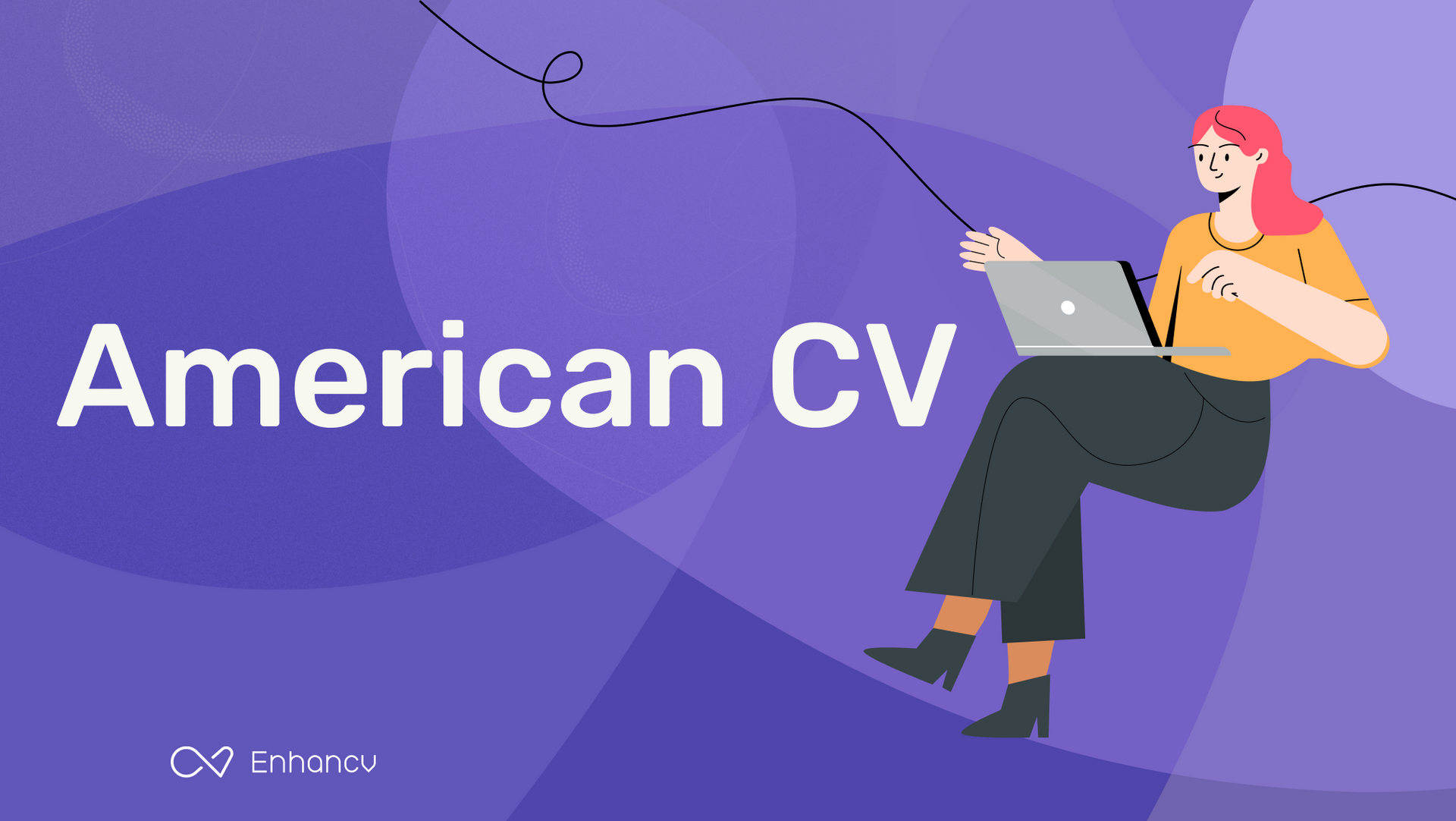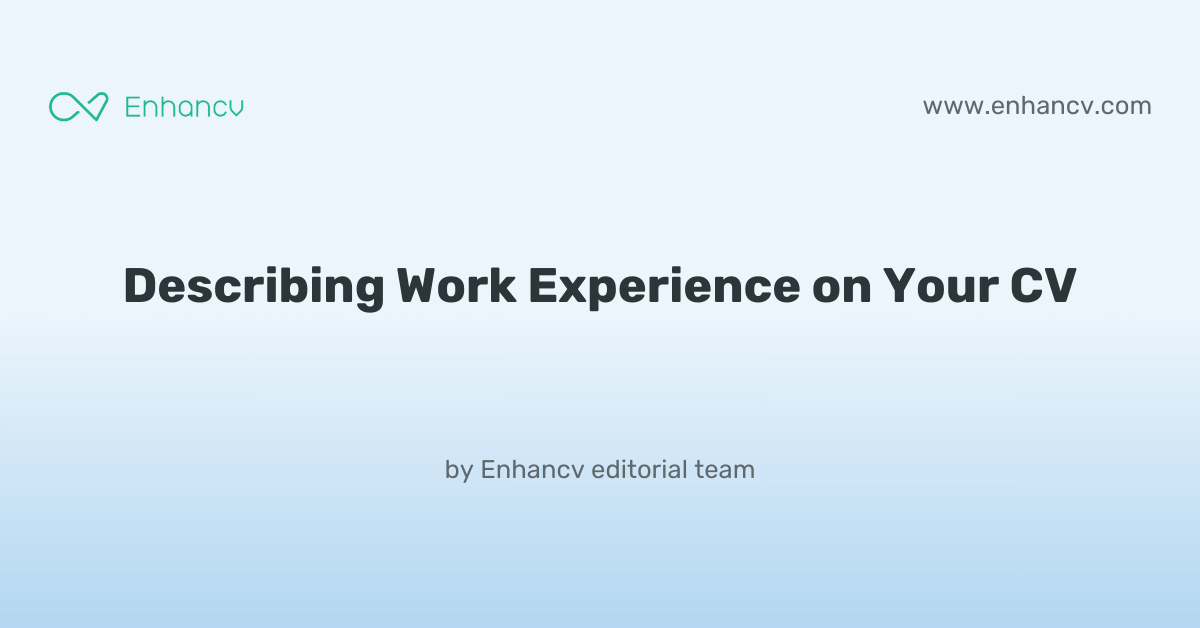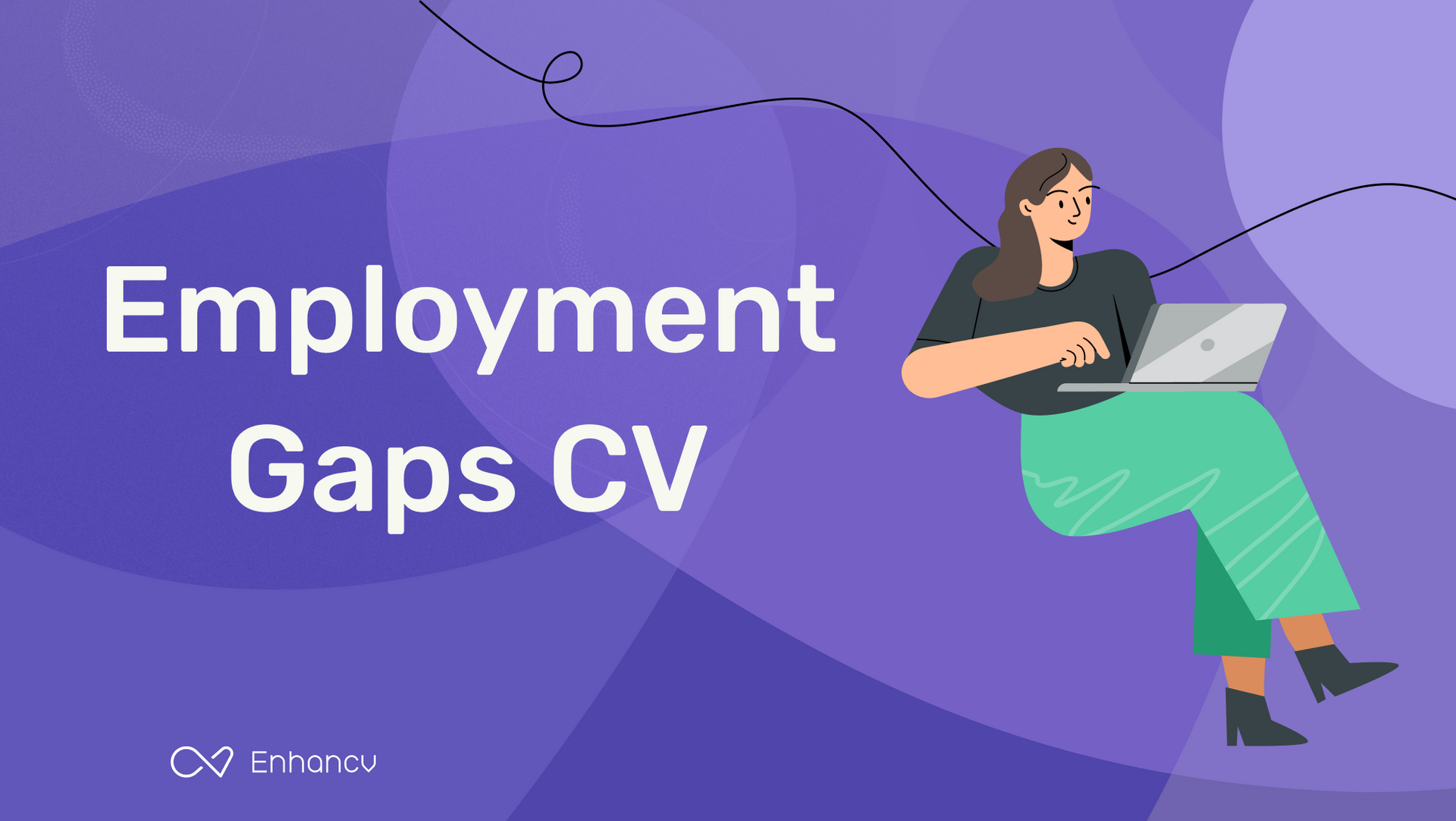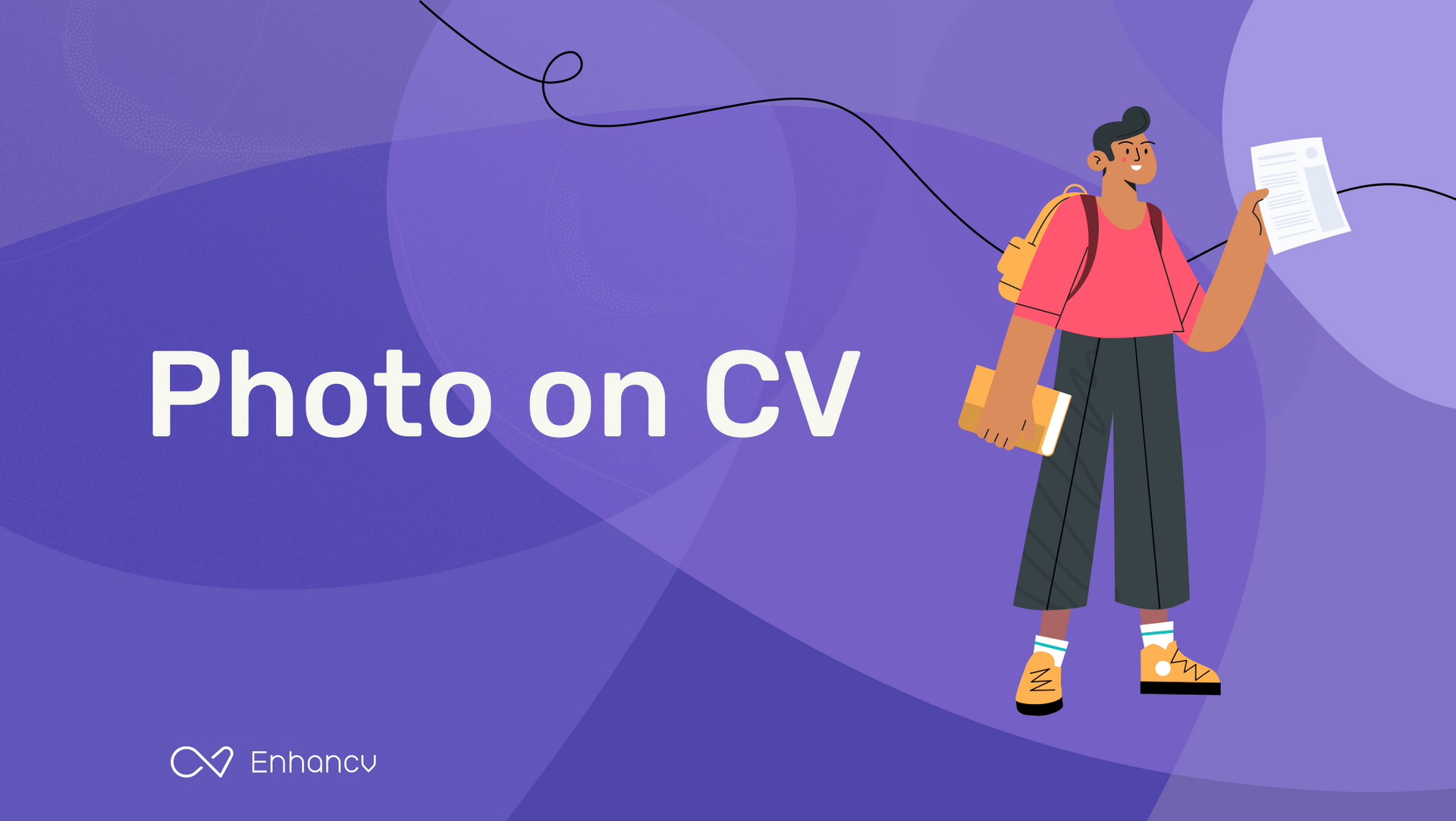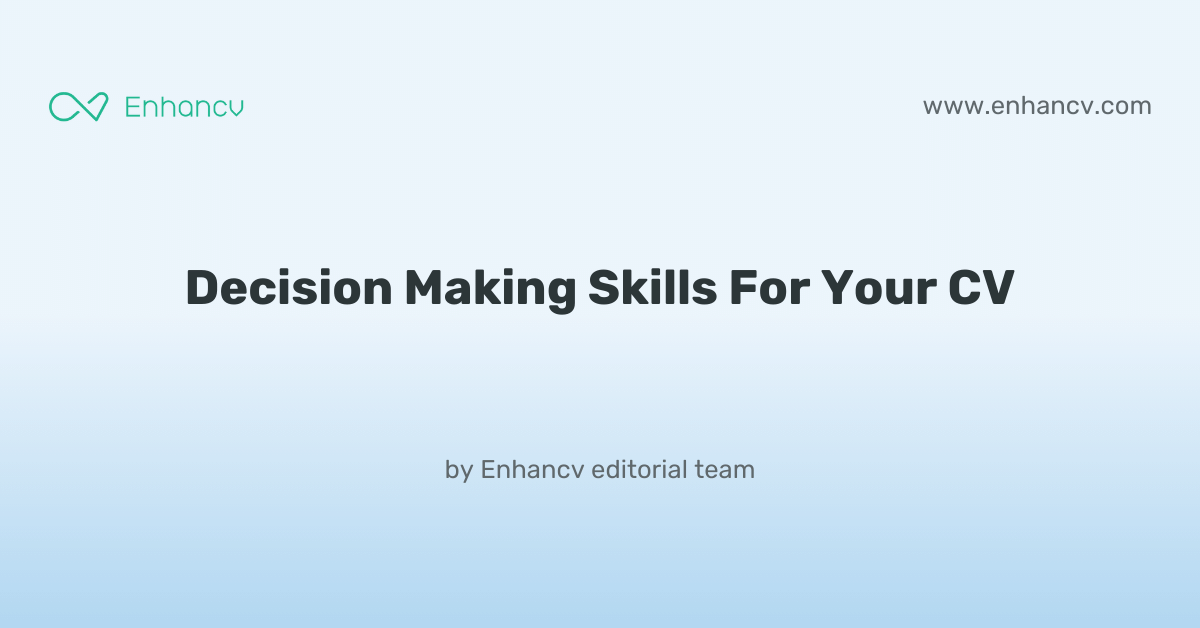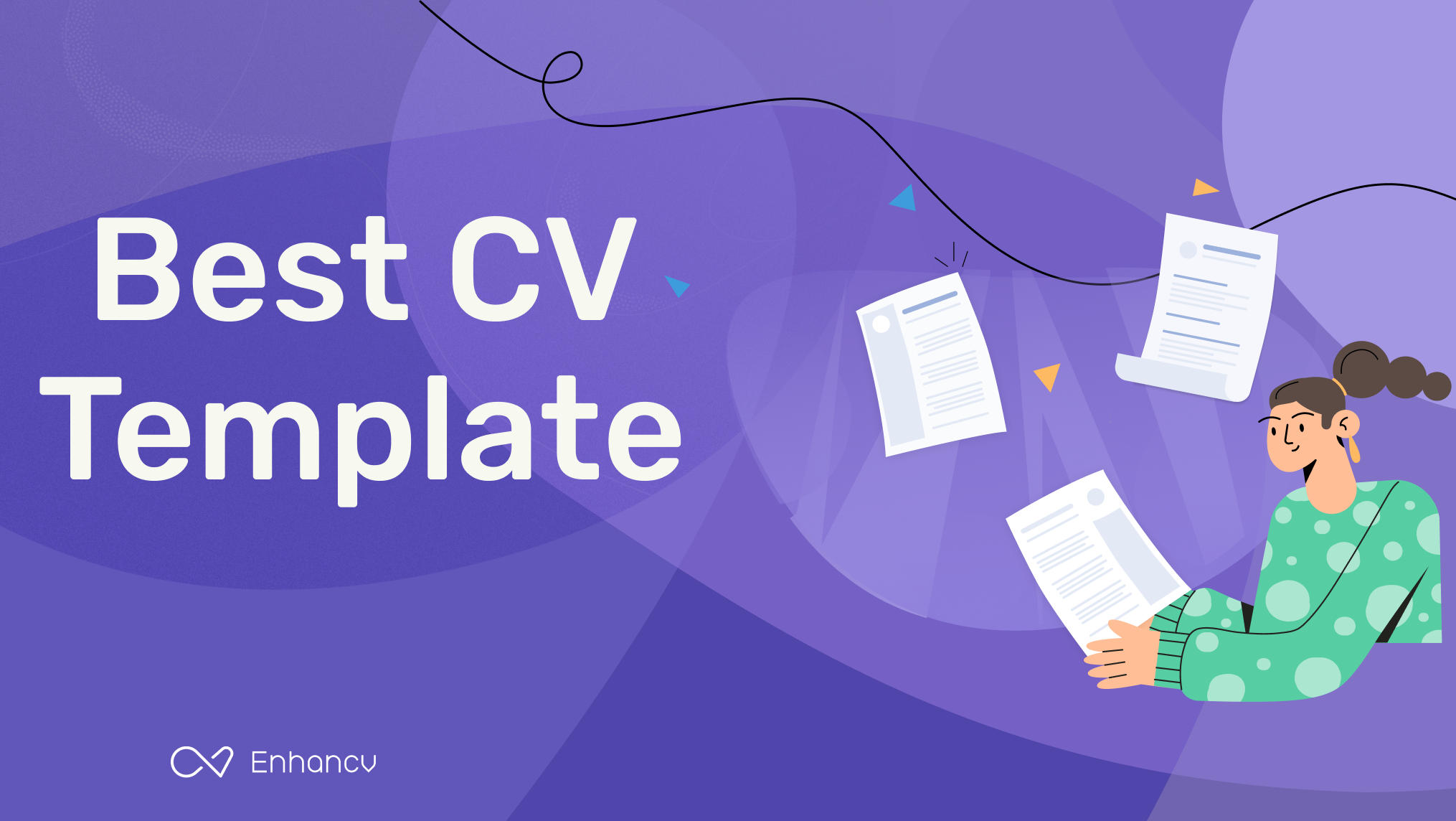One specific CV challenge faced by the hospitality sector involves the effective showcasing of diverse customer service skills in a concise format. Our guide offers tailored strategies to highlight your unique experiences, ensuring your CV stands out to potential employers in this dynamic industry.
- Applying the simplest CV design, so that recruiters can easily understand your expertise, skills, and professional background;
- Ensuring you stand out with your header, summary or objective statement, and a designated skills section;
- Creating your CV experience section - no matter how much expertise you have;
- Using real life professional CV examples to enhance the structure and outline of your profile.
If you still have no muse to write your professional CV, find some more industry-leading examples.
Formatting your hospitality CV to meet the role expectations
Staring at the blank page for hours on end, you still have no idea how you should start your professional hospitality CV. Should you include more colours, two columns, and which sections? What you should remember about your CV format is this - ensure it's minimalistic and doesn't go over the top with fancy fonts and many colours. Instead, focus on writing consistent content that actually answers the job requirements. But, how about the design itself :- Use the reverse chronological order to showcase your experience, starting with your most recent role;
- Include your contact details (email address, phone number, and location) - and potentially your professional photo - in the header;
- Must-have CV sections include summary or objective, experience, education, and skills: curate the ones that fit your profile;
- Your professional hospitality CV should be between one-to-two pages long: select the longer format if you have more experience.
A little bit more about your actual CV design, ensure you're using:
- plenty of serif or sans serif font (e.g. Montserrat, Exo 2, Volkhov) as they are Applicant Tracker System (ATS) compliant. Avoid the likes of Arial and Times New Roman because most candidates' CVs are in this typography.
When submitting your CV, are you still not sure what format it should be? Despite the myth that has been circling around, most modern ATS systems are perfectly capable of reading PDFs. This format is an excellent choice as it keeps all of your information intact.
PRO TIP
Incorporate a touch of colour in headers or section breaks, but keep it professional and ensure it doesn’t detract from readability, especially in more conservative industries.
The top sections on a hospitality CV
- Personal Statement details your passion for hospitality, giving employers a glimpse into your enthusiasm and commitment to the industry.
- Employment History showcases your previous roles and achievements, emphasising your experience in hospitality settings.
- Customer Service Skills highlight your ability to interact positively with guests, a core competency in hospitality roles.
- Hospitality Qualifications list relevant formal training, demonstrating your knowledge base and dedication to professional development.
- Languages Spoken is a valuable section indicating your ability to communicate with a diverse clientele, which is crucial in hospitality.
What recruiters value on your CV:
- Emphasise your customer service skills, showcasing times when you've provided exceptional service, resolved conflicts, or received positive feedback from guests or management.
- Highlight your ability to work in fast-paced environments, including specific situations where you've managed high volumes of customers efficiently without compromising service quality.
- Demonstrate your knowledge of health and safety regulations, particularly any certifications you hold such as food handling or alcohol service, which are vital in the hospitality sector.
- Showcase your adaptability and flexibility by providing examples of when you've covered multiple roles or adapted to unexpected changes, including taking on extra shifts or learning new skills quickly.
- Include language skills and any experience with international clientele, as fluency in multiple languages and cultural sensitivity are great advantages in the hospitality industry.
Recommended reads:
What information should you include in your hospitality CV header?
The CV header is potentially the section that recruiters would refer to the most, as it should include your:
- Contact details - your professional (non-work) email address and phone number;
- Professional photograph - if you're applying hinting at the value you bring as a professional.
Many professionals often struggle with writing their hospitality CV headline. That's why in the next section of this guide, we've curated examples of how you can optimise this space to pass any form of assessment.
Examples of good CV headlines for hospitality:
- Executive Chef | Culinary Excellence | Menu Development | Health & Safety | 10+ Years of Diverse Experience
- Hotel General Manager | Operational Leadership | Revenue Management | Guest Satisfaction | Hospitality Management Degree
- Senior Event Coordinator | Corporate Events Specialist | Project Management | 7+ Years in Event Planning
- Front Office Supervisor | Guest Relations Expert | Multilingual | Team Leadership | 5 Years Front Desk Experience
- Housekeeping Manager | Quality Control | Staff Training | Resource Management | Hospitality Industry Veteran
- Bar Manager | Mixology Enthusiast | Inventory Control | License & Certification | Over 8 Years of Dynamic Experience
Choosing your opening statement: a hospitality CV summary or objective
At the top one third of your CV, you have the chance to make a more personable impression on recruiters by selecting between:
- Summary - or those three to five sentences that you use to show your greatest achievements. Use the CV summary if you happen to have plenty of relevant experience and wish to highlight your greatest successes;
- Objective - provides you with up to five sentences to state your professional aims and mission in the company you're applying for
CV summaries for a hospitality job:
- With over 10 years of dedicated experience in luxury hotel management, proficient in leading high-performance teams to elevate guest satisfaction and operational efficiency, I have proudly spearheaded the turnaround of the Ritz-Carlton’s guest services department, increasing guest retention rates by 25%.
- Passionate culinary professional with 7 years of experience in Michelin-starred restaurants, I bring expertise in menu development and kitchen management, having successfully launched an innovative farm-to-table concept that boosted our restaurant’s reputation and increased annual revenue by 30%.
- Meticulous financial analyst with a decade of experience in the fast-paced securities sector, eager to apply a keen eye for detail and exceptional numerical skills to enhance the financial operations and strategic planning within the hospitality industry, aiming to contribute to sustainable revenue growth and cost control.
- Award-winning marketing manager transitioning from the competitive tech startup environment to hospitality, with an impressive track record of creating viral campaigns that bolstered user engagement by 70%. Dedicated to transferring storytelling skills and digital expertise to craft compelling brand experiences in tourism and guest services.
- As an ambitious individual with a vibrant passion for travel and a customer-centered mindset, I am eager to embark on a career in hospitality management. With a strong educational background in business administration and exceptional interpersonal skills, my objective is to contribute to creating memorable guest experiences while developing a deep understanding of the luxury hospitality sector.
- I am an enthusiastic graduate in International Relations, with a flair for languages and cross-cultural communication, seeking to enter the hospitality industry. Open to learning, I aim to leverage my organizational skills and adaptability to thrive in a dynamic environment and make a lasting positive impact on guest services.
More detailed look into your work history: best advice on writing your hospitality CV experience section
The CV experience is a space not just to merely list your past roles and responsibilities. It is the CV real estate within which you could detail your greatest accomplishments and skills, while matching the job requirements. Here's what to have in your experience section:
- Prove you have what the job wants with your unique skill set and past successes;
- Start each bullet with a strong, action verb, and continue with the outcome of your responsibility;
- Use any awards, nominations, and recognitions you've received as solid proof of your skill set and expertise;
- align your experience with the role responsibilities and duties.
For more help on how to write your CV experience section, check out the next section of our guide:
Best practices for your CV's work experience section
- Highlight customer service skills, showcasing specific instances where you enhanced guest satisfaction and addressed customer needs effectively.
- Detail your experience with booking and reservation systems, emphasising your ability to manage occupancy and maximise revenue through efficient room allocation.
- Include any experience with event planning and coordination, outlining your ability to handle logistics, catering, and guest accommodations seamlessly.
- Mention your proficiency in multiple languages if applicable, as this is a significant advantage in communicating with a diverse clientele.
- Describe your leadership experience, especially if you've managed teams, by mentioning how you motivated staff and maintained high service standards.
- Document your knowledge of health and safety protocols, particularly in food handling and preparation if relevant to your hospitality role.
- Exemplify your ability to handle financial transactions, balance registers, and manage budgets within the context of the hospitality industry.
- Showcase your adaptability and problem-solving skills, illustrating situations where you successfully managed unexpected challenges or guest complaints.
- Reference your experience with cutting-edge hospitality technology, such as property management systems, point of sale systems, or online booking platforms.
- Improved guest satisfaction scores by implementing a new customer engagement strategy which raised our hotel's rating by 15% on travel review platforms.
- Led a team of 20 hospitality staff, overseeing scheduling, training, and performance evaluations, which decreased staff turnover by 25%.
- Managed the coordination and execution of 50+ high-profile business conferences, enhancing the hotel's reputation for excellence in event hospitality.
- Directed the development and launch of a new loyalty program, increasing repeat customer visits by 30% within the first year.
- Negotiated with vendors to reduce costs for amenities and supplies by 20%, significantly increasing the profit margins for hospitality services.
- Spearheaded the renovation project of the guest lounges leading to an enhanced visitor experience and a 10% upsurge in lounge usage.
- Launched and managed a guest feedback system, collating over 1,200 responses and identifying key areas for service improvement.
- Orchestrated a staff upskill program that increased the team’s efficiency by 35%, resulting in a smoother guest check-in/out process.
- Developed a resource allocation plan that optimized the use of hospitality facilities, leading to a 20% increase in event bookings.
- Revitalized the hotel's breakfast service offering, yielding a 50% increase in breakfast up-sell rates.
- Conducted training for a multicultural team, improving communication skills and cultural awareness, and decreasing guest complaints by 40%.
- Implemented energy-saving measures across the hospitality department, cutting down utility expenses by 15%.
- Cultivated strategic partnerships with local tour operators to provide guests with unique experiences, enhancing the hotel's market position.
- Oversaw the introduction of a new property management system which increased operational efficiency by 25%.
- Managed budgeting for the hospitality department, consistently coming in under budget by 10% through careful cost control measures.
- Revamped the wine and dine experience, driving a 20% revenue increase in the hotel's in-house restaurant.
- Pioneered a staff incentive scheme that boosted employee morale and decreased absenteeism by 18%.
- Collaborated with IT to introduce a mobile app for guest services, which has been downloaded by 70% of existing guests, improving service accessibility.
- Organized and executed bespoke wedding packages, averaging 30 successful events a year, translating to a steady 20% year-on-year growth in the wedding segment.
- Enhanced employee training modules, which resulted in the team winning 'Best Hospitality Service' in a national competition.
- Drove a successful rebranding campaign for the hotel's lounge area, attracting a 25% increase in local non-resident clientele.
- Managed an international training exchange program, increasing staff cultural competence and language skills, contributing to a 10% boost in revenue from international guests.
- Orchestrated the transition to eco-friendly hospitality supplies, resulting in a 30% reduction in waste and a positive brand recognition in the market.
- Facilitated cross-training among staff to improve flexibility and service response times, achieving an all-time high staff versatility rating.
How to ensure your hospitality CV stands out when you have no experience
This part of our step-by-step guide will help you substitute your experience section by helping you spotlight your skill set. First off, your ability to land your first job will depend on the time you take to assess precisely how you match the job requirements. Whether that's via your relevant education and courses, skill set, or any potential extracurricular activities. Next:
- Systematise your CV so that it spotlights your most relevant experience (whether that's your education or volunteer work) towards the top;
- Focus recruiters' attention to your transferrable skill set and in particular how your personality would be the perfect fit for the role;
- Consider how your current background has helped you build your technological understanding - whether you've created projects in your free time or as part of your uni degree;
- Ensure you've expanded on your teamwork capabilities with any relevant internships, part-time roles, or projects you've participated in the past.
Recommended reads:
PRO TIP
Talk about any positive changes you helped bring about in your previous jobs, like improving a process or helping increase efficiency.
Mix and match hard and soft skills across your hospitality CV
Your skill set play an equally valid role as your experience to your application. That is because recruiters are looking for both:
- hard skills or your aptitude in applying particular technologies
- soft skills or your ability to work in a team using your personal skills, e.g. leadership, time management, etc.
Are you wondering how you should include both hard and soft skills across your hospitality CV? Use the:
- skills section to list between ten and twelve technologies that are part of the job requirement (and that you're capable to use);
- strengths and achievements section to detail how you've used particular hard and soft skills that led to great results for you at work;
- summary or objective to spotlight up to three skills that are crucial for the role and how they've helped you optimise your work processes.
One final note - when writing about the skills you have, make sure to match them exactly as they are written in the job ad. Take this precautionary measure to ensure your CV passes the Applicant Tracker System (ATS) assessment.
Top skills for your hospitality CV:
Customer Service
Food & Beverage Knowledge
Hospitality Management
Reservation Systems
Event Planning
Problem-Solving
Multitasking
Menu Planning
Housekeeping Standards
Point of Sale (POS) Systems
Communication
Empathy
Flexibility
Teamwork
Attention to Detail
Leadership
Patience
Conflict Resolution
Initiative
Time Management
PRO TIP
If you have received professional endorsements or recommendations for certain skills, especially on platforms like LinkedIn, mention these to add credibility.
Further professional qualifications for your hospitality CV: education and certificates
As you're nearing the end of your hospitality CV, you may wonder what else will be relevant to the role. Recruiters are keen on understanding your academic background, as it teaches you an array of hard and soft skills. Create a dedicated education section that lists your:
- applicable higher education diplomas or ones that are at a postgraduate level;
- diploma, followed up with your higher education institution and start-graduation dates;
- extracurricular activities and honours, only if you deem that recruiters will find them impressive.
Follow a similar logic when presenting your certificates. Always select ones that will support your niche expertise and hint at what it's like to work with you. Balance both technical certification with soft skills courses to answer job requirements and company values. Wondering what the most sought out certificates are for the industry? Look no further:
PRO TIP
Use mini case studies or success stories in your CV to demonstrate how your skills have positively impacted previous roles or projects.
Recommended reads:
Key takeaways
What matters most in your hospitality CV-writing process is for you to create a personalised application. One that matches the role and also showcases your unique qualities and talents.
- Use the format to supplement the actual content, to stand out, and to ensure your CV experience is easy to comprehend and follows a logic;
- Invest time in building a succinct CV top one third. One that includes a header (with your contact details and headline), a summary or an objective statement (select the one that best fits your experience), and - potentially - a dedicated skills section or achievements (to fit both hard skills and soft skills requirements);
- Prioritise your most relevant (and senior) experience closer to the top of your CV. Always ensure you're following the "power verb, skill, and achievement" format for your bullets;
- Integrate both your technical and communication background across different sections of your CV to meet the job requirements;
- List your relevant education and certificates to fill in gaps in your CV history and prove to recrutiers you have relevant technical know-how.
